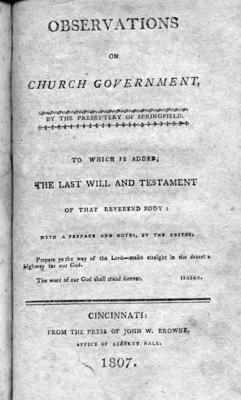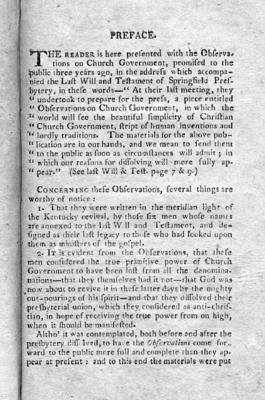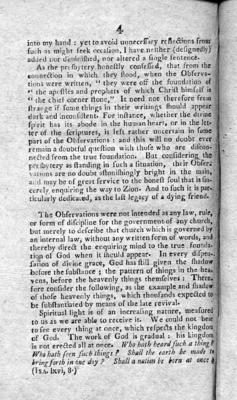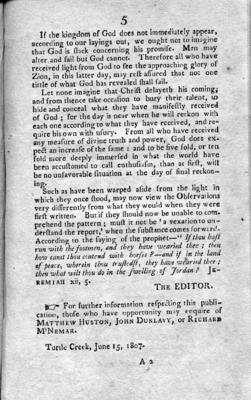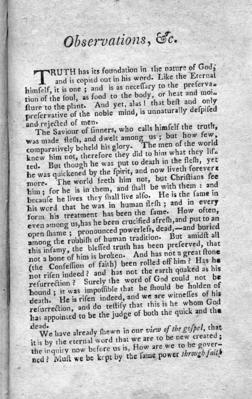Pages
Page 1
OBSERVATIONS
ON
CHURCH GOVERNMENT
BY THE PRESBYTERY OF SPRINGFIELD
TO WHICH IS ADDED;
THE LAST WILL AND TESTAMENT
OF THAT REVEREND BODY:
WITH A PREFACE AND NOTES, BY THE EDITOR.
Prepare ye the way of the Lord-make straight in the desart a highway for our God.
The word of our God shall stand forever. ISAIAH.
CINCINNATI: FROM THE PRESS OF JOHN W. BROWNE, OFFICE OF LIBERTY HALL.
1807.
Page 2
PREFACE. THE READER is here presented with the Observations on Church Government, promised to the public three years ago, in the address which accompanied the Last Will and Testament of Springfield Presbytery, in these words--" At their last meeting, they "undertook to prepare for the press, a piece entitled "Observations on Church Government, in which the "world will see the beautiful simplicity of Christian "Church Government, stript of human inventions and "lordly traditions. The materials for the above pub"lication are in our hands, and we mean to send them "to the public as soon as curcumstances will admit ; in "which our reasons for dissolving will more fully ap"pear." (See last Will & Test. page 7 & 9.)
Concerning these Obsrvations, several things are worthy of notice: I. That they were written in the meridian light of the Kentucky revival, by those six men whose names are annexed to the last Will and Testament, and designed as their last legacy to those who had looked upon them as ministers of the gospel. 2. IT is evident from the Observations, that these men considered the true primitive power of the Church Government to have been lost from all the denominanations--that they themselves had it not-- that God was now about to revive it in these latter days by the mighty out-pourings of his Spirit -- and that they dissolved their presbyterial union, which they considered as anti--christian, in hope of receiving the true power from on high, when it should be manifested. Altho' it was contemplated, both before and after the presbytery dissolved, to have the Observations come forward to the public more full and complete than they appear at present : and to this end the materials were put
Page 3
4
into my hand : yet to avoid unnecessary reflections from such as might seek occasion, I have neither ( designedly ) added nor diminshed, not altered a single sentence. As the presbytery honestly confessed, that from the connection in which they stood, when the Observations were written, "they were off the foundation of " the apostles and prophets of which Christ himself is " the chief corner stone," It need not therefore seem strange if some things in their writings should appear dark and inconsistent. For instance, whether the divine Spirit has its abode in the human heart, or in the letter of the Scriptures, is left rather uncertain in some part of the Obsrvations : and this will no doubt ever remain a doubtful question with those who are disconnected from the true foundation. But considering the presbytery as standing in such a situation, their Observations are no doubt astonishingly bright in the main, and may be of great service to the honest soul that is sincerely enquiring the way to Zion. And to such it is particularly dedicated, as the last legacy of a dying friend.
The Obsrvations were not intended as any law, rule, or form of discipline for the government of any church, but merely to describe that church which is governed by an internal law, without any written form of words, and thereby direct the enquiring mind to the true foundation of God when it should appear. In every dispensation of divine grace, God has still given the shadow before the substance ; the pattern of things in the heavens, before the heavenly things themselves : Therefore consider the following, as the example and shadow of those heavenly things, which thousands expected to be substantiated by means of the late revival. Spiritual light is of an increasing nature, measured to us as we are able to receive it. We could not bear to see every thing at once, which respects the kingdom of God. The work of God is gradual : his kingdom is not erected all at once. Who hath heard such a thing? Who hath seen such things? Shall the earth be made to bring forth in one day? Shall a nation be born at once ? (ISA.lxvi,8.)
Page 4
5 If the kingdom of God does not immediately appear, according to our layings out, we ought not to imagine that God is slack concerning his promise. Men may alter and fail but God cannot. Therefore all who have received light from God to see the approaching glory of Zion, in this latter day, may rest assured that not one tittle of what God has revealed shall fail. Let none imagine that Christ delayeth his coming, and from thence take occasion to bury their talent, to hide and conceal what they have manifestly received of God ; for the day is near when he will reckon with each one according to what they have received, and require his own with usury. From all who have received any measure of divine truth and power, God does expect an increase of the fame : and to be five fold, or ten fold more deeply immersed in what the world have been accustomed to call enthusiasm, than at first, will be no unfavorable situation at the day of final reckoning. such as have been warped aside from the light in which they once stood, may now view the Observations very differently from what they would when they were first written. But if the should now be unable to comprehend the pattern ; must if not be 'a vexation to understand the report.' when the substance comes forward. According to the saying of the prophet --" If thou hast run with the footmen, and they have wearied thee ; then how canst thou contend with horses ? ---and if in the land of peace, wherein thou trustedst, they have wearied thee ; then what wilt thou do in the swelling of Jordan ? JE - REMIAH xii, 5. THE EDITOR.
[small image of a hand with finger pointing toward text] For further information respecting this publication, those who have opportunity may enquire of MATTHEW HUSTON, JOHN DUNLAVY, or RICHARD M'NEMAR.
Turtle Creek, June 15, 1807.
A 2
Page 5
Observations, & c.
TRUTH has its foundation in the nature of God ; and is copied out in his word. Like the Eternal himself, it is one ; and is as necessary to the preservation of the foul, as food to the body, or heat and moj future to the plant. And yet, alas ! that best and only preservative of the noble mind, is unnaturally despised and rejected of men. The Saviour of sinners, who calls himself the truth, was made flesh, and dwelt among us ; but how few, comparatively beheld his glory. The men of the world knew him not, therefore they did to him what they lis ted. But though he was put to death in the flesh, yet he was quickened by the spirit, and now liveth forever more. The world seeth him not, but Christians see him ; for he is in them, and shall be with them : and because he lives they shall live also. He is the same in his word that he was in human flesh ; and in every form his treatment has been the same. How often, even among us, has he been crucified afresh, --and put to an open shame ; pronounced powerless, dead,-- and buried among the rubbish of human tradition. But amidst all this infamy. the blessed truth has been preserved, that not a bone of him is broken. And has not a great stone (the confession of faith) been rolled off him ? Has he not risen indeed ? and has not the earth quaked at his resurrection ? Surely the word of God could not be bound ; it was impossible that he should be holden of death. He is risen indeed, and we are witnesses of his resurrection, and do testify that this is he whom God has appointed to be the judge of both the quick and the dead. We have already shewn in our view of the gospel, that it is by the eternal word that we are to be new created ; the inquiry now before us is. How are we to be governed ? Must we be kept by the same power through faith
